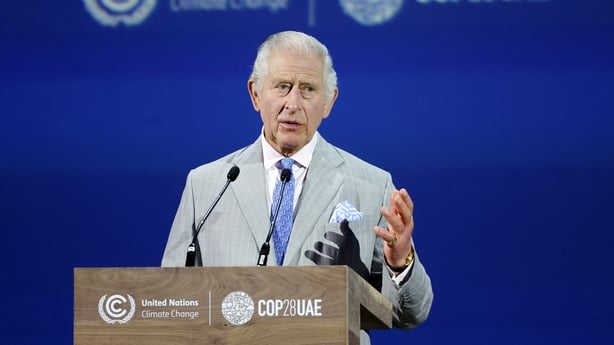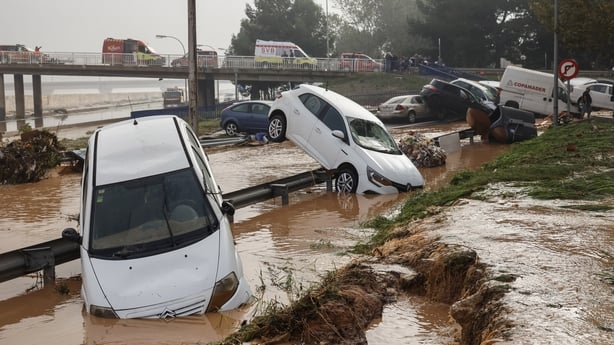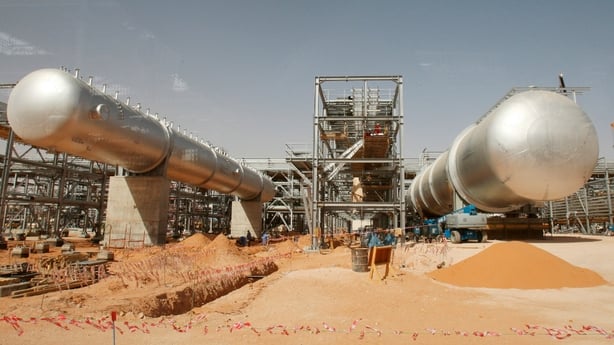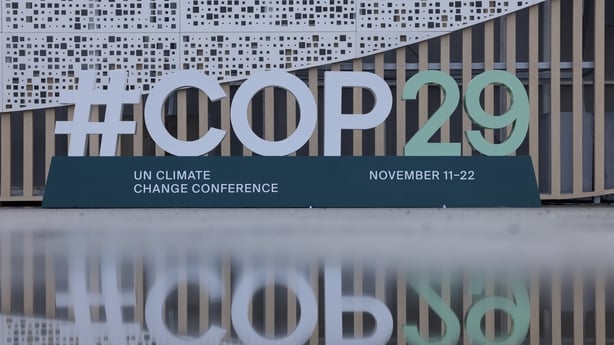Tens of thousands of people will attend the COP29 climate talks in Baku, the capital of Azerbaijan, which start tomorrow and run for the next two weeks.
A total of 85,000 attended the equivalent event, COP28, in Dubai last year.
We will need to wait until the talks are finished to know if the interest is going to be as big this time round.
No negotiations, anywhere in the world, come close in terms of complexity to the UN climate negotiation process.
In all, 197 disparate countries, plus the European Union are involved. That's 198 parties all trying to find common ground and agree to economic, social, financial, legal, lifestyle, and infrastructural changes.
We need your consent to load this rte-player contentWe use rte-player to manage extra content that can set cookies on your device and collect data about your activity. Please review their details and accept them to load the content.Manage Preferences
There will be many memorable appeals urging negotiators to do whatever it takes to deliver a good outcome.
Some of the sentiments from last year in Dubai could easily be repeated at COP29 because they are just as relevant this time round.
Britain’s Prince Charles posed one key question, devastating in its simplicity, that still reverberates:
"How dangerous are we prepared to make the climate? If we don’t restore nature we will perish" the British monarch said.
"The Earth does not belong to us, we belong to the Earth", Charles added.
We can expect a bit more of that this time round, especially in the first three days when global leaders and statesmen address the delegates.
However, we are heading for an average of three degrees Celsius of global warming by the end of this century.
And Europe is heating twice as fast.

The catastrophic rainfall over the past few weeks in Spain underscores the urgent need to upgrade and climate-proof all public infrastructure to save lives, livelihoods and lifestyles as extreme weather events become more frequent and more devastating.
However that is just Europe, one of the wealthiest and most stable parts of the world.
What about extreme weather events and the burden of climate change in less developed and far poorer places? Who is going to help them?
How can they pick themselves up and recover from climate devastation? Who will provide the money for poorer countries to invest in infrastructure and systems that might protect them when the next climate disaster comes?
And how can they afford the transformation to the low-carbon technologies the rich world says is essential to stop greenhouse gas emissions.
Finding answers to all that is the number one issue that COP29 delegates are going to address in Baku. Climate finance is central this time round.
There is even new financial terminology for it, it is called the "New Collective Qualified Goal" or NCQG.
Unfortunately, this is not a user-friendly term. It is quite a mouthful to say. Even after repeating it myself multiple times I still cannot get it into my head.
The term "New Collective Qualified Goal" was mentioned in the 2015 Paris Climate Accord, but we have heard very little about it ever since.
Until now that is.
NCQG’s are something we are going to hear a lot more about at COP29 over the next two weeks.
It is all about creating a new, extremely large, continuous and unprecedented flow of cheap money, more than a trillion dollars per year, that can be easily accessed by poorer nations for climate purposes.

The money is to be sourced from governments and other avenues in rich and developed nations.
Expect major arguments about what constitutes a developing country for this purpose.
Currently the UN uses a 1992 list of developing and poorer countries. Countries like China, Saudi Arabia, United Arab Emirates, and Qatar were included on that list because they were poorer back then. But these nations have all progressed very rapidly since then.
China is the second largest economy in the world and far wealthier than in 1992.
Many of the Arab oil producing nations have also become mega rich and have enjoyed huge economic progress since then.
In the context of climate finance however, none of them wants their special status of "less developed country" to be taken away.
That’s because keeping it would allow them to draw down huge amounts of very cheap international climate finance for much desired infrastructural investment.

They are also resisting the demands and expectations from Europe, the United States and elsewhere that, rather than drawing down cheap climate finance, China and the big oil producing nations should become givers to the NCQG, not receivers.
Skin and hair will be flying around the negotiating tables in Baku over the next two weeks before that issue is resolved.
Lots of other issues are also expected to be tackled at COP29.
More money is needed for the Loss and Damage fund agreed to last year in Dubai. Where is that to come from and how? The commitment to start transitioning away from using fossil fuels in energy production needs to be progressed and will be very tricky too.
Read more stories related to climate change
Countries will also be kept under pressure to ratchet up their national promises to cut greenhouse gas emissions.
Meanwhile climate scientists, environmentalists and non-organisations are deeply unhappy that a massive oil producing nation is hosting the talks for a second year in a row.
The fear is that this allows fossil fuel producers to capture the agenda and lead the proceedings in a manner that might serve their own interests first.

Everyone associated with COP29 agrees that fossil fuel production and consumption is the cause of climate change.
Yet we know too that to protect and drive their own profits, fossil fuel producers have lied for decades.
They deliberately hid the fact that their own scientists told them about the catastrophic and irreversible climate damage burning oil and gas would cause.
That cynicism about oil producers and lobbyists is sky high again this year at COP29.
In recent days it emerged that Elnur Soltanov, the Azeri Minister appointed Chief Executive of COP29, was recorded using his position to help achieve lucrative new oil and gas deals for Azerbaijan.
The same thing happened last year in Dubai, when briefing notes prepared for the President of COP28, Dr Sultan al Jabber, showed the United Arab Emirates planned to use their presidency of COP28 to help tie down lucrative oil and gas deals of that country too.
With history seemingly repeating itself and policy changes proving crucial to combat climate change, we will have to wait and see what the next two weeks are going to bring.








